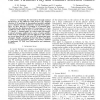Free Online Productivity Tools
i2Speak
i2Symbol
i2OCR
iTex2Img
iWeb2Print
iWeb2Shot
i2Type
iPdf2Split
iPdf2Merge
i2Bopomofo
i2Arabic
i2Style
i2Image
i2PDF
iLatex2Rtf
Sci2ools
CORR
2010
Springer
2010
Springer
On the Fictitious Play and Channel Selection Games
—Considering the interaction through mutual interference of the different radio devices, the channel selection (CS) problem in decentralized parallel multiple access channels can be modeled by strategic-form games. Here, we show that the CS problem is a potential game (PG) and thus the fictitious play (FP) converges to a Nash equilibrium (NE) either in pure or mixed strategies. Using a 2−player 2−channel game, it is shown that convergence in mixed strategies might lead to cycles of action profiles which lead to individual spectral efficiencies (SE) which are worse than the SE at the worst NE in mixed and pure strategies. Finally, exploiting the fact that the CS problem is a PG and an aggregation game, we present a method to implement FP with local information and minimum feedback.
| Added | 24 Jan 2011 |
| Updated | 24 Jan 2011 |
| Type | Journal |
| Year | 2010 |
| Where | CORR |
| Authors | Samir Medina Perlaza, Hamidou Tembine, Samson Lasaulce, V. Quintero-Florez |
Comments (0)

